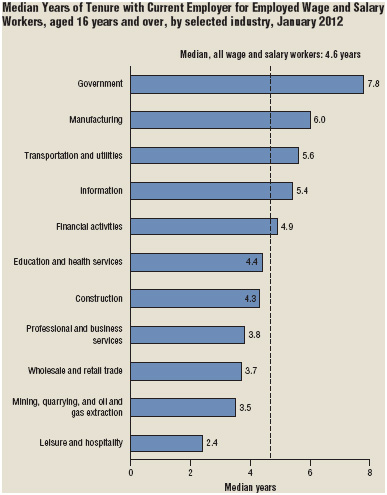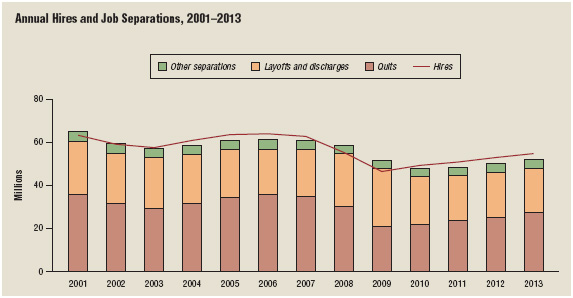What Is the Difference between a Job Transition and a Career Transition?
A career begins when you choose the type of work you want to focus on for a long time. Getting started may involve a considerable investment in education or training. Even if you are just at the beginning of a career path, you might have already put a lot of thought and effort into it. If you are further along the path, your career has probably become a big part of your life. As a result, making a career change is a major decision, and preparing for it can involve large-scale or long-term plans, such as going back to school, moving to a different area, or building a whole new professional network.

Alternatively, you may want to change jobs without changing careers, or perhaps you have not chosen a career yet, or maybe your current job is not on your career path. Whatever the case may be, any work transition deserves careful thought and planning. As Susan Strayer notes in The Right Job, Right Now, “Leaving is a natural process: We can't stay in the same job forever.” She warns, however, that “if you simply walk out, the repercussions are huge.” Preparing for a job change is usually on a smaller scale than preparing for a career change, but there is still much that needs to be done.
Changing careers is usually a matter of choice, but changing jobs can be either voluntary or involuntary. Layoffs and firings both result in involuntary job changes and often happen very suddenly. This makes them more difficult to prepare for, but even if you cannot make specific arrangements, you can be generally prepared for the possibility of suddenly being without work.
What Is Involved in Preparing for a Transition?

Job and career fairs can be great ways to discover new opportunities for you in the current job market. CARLA GOTTGENS/BLOOMBERG/GETTY IMAGES.
Another factor you should consider, especially if you are leaving voluntarily, is how the job you are leaving fits into your career plans. There are a variety of reasons to have a particular job at a particular time. You may think of your current employment as just a way to pay the bills, explore something that interests you, or get general experience. At the other end of the spectrum, your current job may be an important step on your chosen career path. Leaving a job in your field requires extra planning to ensure that your accomplishments will be preserved and your new opportunity will get off to the best start. Nonetheless, every job you ever have becomes part of your record and part of who you are.

Whatever the circumstances surrounding your departure from your current job, the key factor in preparing for a successful transition is organization. To do this, you might want to start a notebook or file to keep track of your plans and organize everything into three main categories: mental, financial, and practical. Writing down your ideas, such as how much money you plan to set aside in a savings account or where you might find a temporary job, and reviewing them from time to time will help to make the transition process seem more manageable.
How Can I Prepare Mentally?
Part of making a successful career or job transition means clearly understanding the reasons for the transition. If you have decided to change your career or leave your job, you should be able to state clearly why you are making this choice. It is important to be comfortable with the decision and ensure that you can explain it to others, including your family,

Some employment sectors have higher turnover than others, so you need to do your homework to see if the sector in which you are interested is a good fit with your job expectations. ILLUSTRATION BY LUMINA DATAMATICS LTD. © 2015 CENGAGE LEARNING®. U.S. Bureau of Labor Statistics, Current Population Survey. “OOChart.” Occupational Outlook Quarterly, Vol. 57, No. 1 (Spring 2013). http://www.bls.gov/opub/ooq/2013/spring/oochart.htm.
friends, coworkers, and boss. Taking the time to imagine these conversations can help you be prepared for when they occur in real life.

If you are leaving one job without another job already lined up, be sure you are mentally prepared for taking on a new job search. Also, keep in mind that a change in your work situation, even if it is voluntary and ultimately beneficial, creates stress. Pay attention to your own feelings and make a plan to take care of yourself physically and mentally. If you are leaving behind a career, take the time to think about what it meant to you, and say a fond farewell.
How Can I Prepare Financially?
Even when leaving one job for another (possibly better) job, it makes sense to plan for additional expenses involved in the transition.

There are millions of employees separated from their jobs each and every year. These separations occur for a variety of reasons. ILLUSTRATION BY LUMINA DATAMATICS LTD. © 2015 CENGAGE LEARNING®. U.S. Bureau of Labor Statistics. “Hires, quits, layoffs, and other job separations in 2013.” The Editor's Desk, July 1, 2014. http://www.bls.gov/opub/ted/2014/ted_20140701.htm.
Commuting, parking, meals, clothes—everything may cost a little more than expected. Finances are much more of a concern, however, if you are leaving one job and have not yet obtained a new one. If you have the choice, try to stay in your current job until you are financially prepared to leave. As a rule of thumb, financial experts recommend having enough savings to live on for at least six months before deciding to set out on your own. This applies whether you plan to freelance
, start your own business, or pursue a career change.
Sometimes it is not possible to stay in one job until you have another. You therefore should have a contingency plan in case you need to go without a regular source of income for a period of time. Ideally, you can have enough money set aside to last through a rough period, but that is not always possible. As a result, it is important to decide ahead of time what you will do if your primary source of income disappears. Consider where you might get a part-time job or a loan, how you might cut expenses, and so on. Write down these ideas ahead of time, and if you lose your job, you will already have a working plan.
How Can I Prepare Practically?
In some ways, practical preparation may be the easiest of the three types of preparation, but it can also be the most time-consuming. If you have decided to leave your job, the goal of practical preparation is to have everything in order by the time you actually hand in your notice. If you are not planning to leave, the goal is to ensure that, if necessary, you could walk out the door with no warning and still be worry free. In order to make sure that you are properly prepared, there are several things you should focus on.
You should also be aware of your employer's policies regarding personal information and possessions. Some companies have strict policies about what an employee may keep at the workplace and how employees can use company property, such as computers and cell phones. If your company has such rules, be sure you are in compliance. If you keep personal files on your company computer, be sure they are always backed up to portable media, such as a flash drive, that goes home with you every day. Also, you should be sure keep them in a single computer folder that can be deleted quickly and easily. In terms of personal possessions, such as pictures and books, you should keep an inventory list of everything in your office or cubicle that belongs to you and note where the items are kept.
Furthermore, unless there is a company policy against this practice, it is a good idea to always maintain a personal backup file of contact information. You may also want to forward to your personal e-mail account any key messages that you might want to consult later. This is especially important if you are concerned about the possibility of involuntary termination or if you think that any controversy may arise when you give notice.
Similarly, it is a good idea to keep copies of any important work you have done during the course of your job, although this is another area where it is important to be sensitive to company policies. You may also want to put together a comprehensive list of projects or products you have worked on, and make a timeline of your progress in the company. It is easier to do these things while you are still on the job than to reconstruct them later, and they may be very useful in the future. Even if you are not expecting to leave your job, it is a good idea to keep this type of information organized and ready to go at a moment's notice.
Finally, it is always a good idea to keep in mind what would happen to your work if you were unable to do it for any reason. Having a plan in place that will allow someone else to step in can be very helpful if you are out for a few days owing to illness or personal matters, and it is doubly important if you are planning to leave your job permanently. Even if you are planning ahead for your departure and are not yet ready to give notice, it is still a good idea to begin to arrange your work so it can be easily reassigned. Wrapping up loose ends and getting ongoing projects in order can make your transition much smoother.